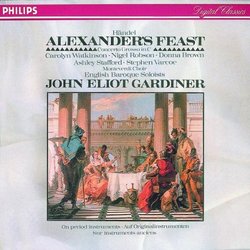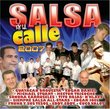| All Artists: Handel, Gardiner, Watkinson Title: Alexander's Feast Members Wishing: 0 Total Copies: 0 Label: Polygram Records Release Date: 10/25/1990 Genre: Classical Styles: Opera & Classical Vocal, Forms & Genres, Concertos, Historical Periods, Baroque (c.1600-1750) Number of Discs: 1 SwapaCD Credits: 1 UPC: 028942205321 |
Search - Handel, Gardiner, Watkinson :: Alexander's Feast
CD DetailsSimilar CDs
|
CD ReviewsLibretto by John Dryden Bill King | Reno, Nv., United States | 04/19/2003 (5 out of 5 stars) "If Messiah is the greatest Christian oratorio, then I nominate this a candidate for the pagan crown. The poem is high art most worthy of a Handel to set it to music all the while being scrupulous with the text. But no more of my amateurish opinions, here are some random shorts from Winton Dean's liner notes:"Alexander's Feast" was an immediate and lasting success. Of Handel's major works only "Acis and Galatia" and Messiah were performed more frequently performed during his life.""There are seven accompanied recitatives, the most dramatic of all gestures-- and exceptional number even in a three act work-- all of outstanding quality. Most of them occur in the fourth and sixth stanzas where Handel makes the most of his new technique. When the music has excited the King into fighting his battles over and over again and bread a mad over confidence, Timotheous reduces him to humility and tears by recounting the fate of [Persian Emperor} Darius." "A present deity," they shout around: "A present deity," the vaulted roofs rebound. With ravish'd ears The monarch hears, Assumes the god, Affects to nod, And seems to shake the spheres. Bacchus' blessings are a treasure, Drinking is the soldier's pleasure; Rich the treasure, Sweet the pleasure, Sweet is pleasure after pain. Sooth'd with the sound, the king grew vain; Fought all his battles o'er again; And thrice he routed all his foes; and thrice he slew the slain. The master saw the madness rise, His glowing cheeks, his ardent eyes; And, while he heav'n and earth defied, Chang'd his hand, and check'd his pride. He chose a mournful Muse, Soft pity to infuse; He sung Darius great and good, By too severe a fate, Fallen, fallen, fallen, fallen, Fallen from his high estate, And welt'ring in his blood; Deserted, at his utmost need By those his former bounty fed; On the bare earth expos'd he lies, With not a friend to close his eyes." ...Another stroke of genius is Handel's treatment of the famous line "Fallen, fallen, fallen, fallen... He contracts the word to a monosyllable (fall'n), repeats it at unpredictable intervals, both of time and pitch, over pedal notes and staccato violin ostinato, suggests the tragedy of Darius' fall in the harmony, and then varies all these components when the line is repeated by the chorus. It is a supreme example of music's power to enlarge a poetic idea."----------Phillip's includes an unusually large and well illustrated booklet. -------- Donna Brown Soprano Carolyn Watkinson Contralto Ashly Stafford Countertenor Nigel Robson Tenor Stephen Varcoe Bass" A voice teacher and early music fan George Peabody | Planet Earth | 03/06/2009 (5 out of 5 stars) "ALEXANDER REJECTED- ST. CECELIA RESPECTED.
'Alexander's Feast' or 'The Power of Music' is based on an ode by John Dryden to celecbrate St. Cecelia, the patron of music, in 1697. Direct connections between the Saint and Dryden's text are few; the text makes reference to her only in its concluding pages. It was arranged for Handel into a sequence of recitations, arias and choruses cast in two parts, by a minor man of letters, Newburgh Hamilton. The 'entertainment' as it was described, is set at the famous feast of Alexander, held to celebrate the conquest of Persepolis. The musical allegory is enhanced by the inclusion at the feast of the legendary Timotheus, and the comparison between him and Cecelia form the climax of the work. There is little dramatic development, but Dryden's picturesque imagery allowed Handel to produce a superbly varied score that includes such famous numbers as the two bass solos:"Bacchus, ever fair"(with chorus) and "Revenge, Timotheus cries". The work is scored for five soloists (SAATB), chorus and a large orchestra employing recorder, oboes, bassoons, horns, trumpets, tympani and strings. The performance of this work by Gardiner and his Monteverdi Choir is nothing short of superb!!!The Choir presents its usual unabated enthusiasm throughout all of their Choruses, and they are present much of the time, which makes for a very 'up' rendition. As per usual, the words are understandable, the balance of the voice parts is excellent and Gardiner keeps everything moving forward in is inimitable way, the drama never ceasing. The soloists, for the most part, are well-chosen, especially Nigel Robson, lead tenor, who sang gloriously and Stephen Varcoe, bass, one of my favorite bassos; he sings with resonance without 'rumbling'. Donna Brown, soprano, a pretty voice, crystal clear who, no matter how high she ascends, her words are always audible. Ashley Stafford, countertenor, in my humble opinion makes good choral contribution, but definitely cannot sustain a solo role; his voice is weak and easy to ignore. But he doesn't solo that much in this work, so it's not that crucial to the overall listen!!! This is a very entertaining work, and much fun to hear!" |




